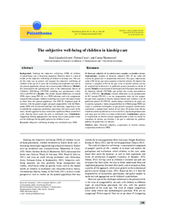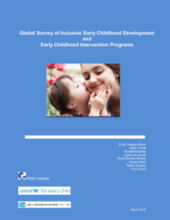Displaying 131 - 140 of 496
This study examined associations between perceived support from adults in three developmental contexts (home, school and neighbourhood) and mental well-being (life satisfaction, self-concept, optimism) among grade four children living with foster parents in British Columbia (B.C.), Canada.
The webinar recording provides a basic overview of the intersection of early childhood development (0-5), attachment and trauma in young migrant children.
This chapter from Re-Visioning Public Health Approaches for Protecting Children argues that mentoring for children in foster care in the US should be considered as one potential strategy for the prevention of adverse outcomes among this vulnerable population.
A pre-post design with 6–13-month follow-up assessed the feasibility and acceptability of a home-visiting intervention to promote early childhood development, improve parenting and shared decision-making, and reduce violence in impoverished Rwandan households.
This article investigates whether individuals who were orphaned as a child suffer long‐term consequences on their pro‐sociality.
This webinar offers foundational information related to the intersection of culture, the migration journey, trauma and assessment.
This book offers a comprehensive overview of the newest contributions to the literature on leaving care in relation to theory, in addition to the Theory of Emerging Adulthood, while also featuring cutting-edge research and best practices that support adjustment across a range of domains for this population.
The aim of this study was to analyse and compare the subjective well-being of children at the age of 12 years old in kinship and residential care and in the general population, taking into account gender differences.
This study draws upon data from the Bucharest Early Intervention Project (BEIP), a longitudinal study exploring the impact of severe psychosocial deprivation on child health and development to examine the relationship between telomere length and psychopathology.
This report presents the findings of a global survey designed to map current implementation of Inclusive Early Childhood Development (IECD) and Early Childhood Intervention (ECI) programs, among other objectives, and outlines recommendations based on those findings.


